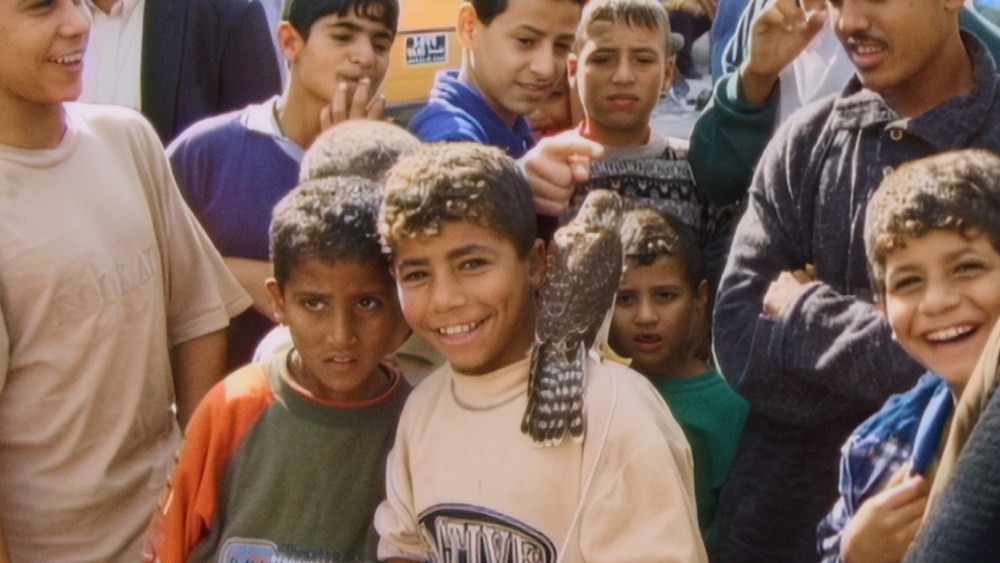Palestinian filmmaker Kamal Aljafari’s “With Hasan in Gaza” will be for many a hauntingly poignant visual journey through Gaza as it existed in 2001.
Based on recently rediscovered video footage shot on a trip to the region 24 years ago, Aljafari describes his latest work as “an homage to Gaza and its people, to all that was erased and that came back to me in this urgent moment of Palestinian existence, or non-existence. It is a film about the catastrophe, and the poetry that resists.”
Kicking off this year’s International Competition in Locarno, “With Hasan in Gaza” follows Aljafari and Hasan, a local guide, on a 2001 road trip as they travel north to south down the coastal strip in search of Abdel Rahim, a man the director met in 1989 when they were serving time together as teenagers in the juvenile section of Israel’s Naqab Desert prison.
At the time, Aljafari was studying film in Cologne, Germany, and was hoping to find Abdel Rahim as part of his research for a planned project about his experience in prison.
Aljafari, who grew up in the Israeli town of Ramle, had been accused by a military court of joining an enemy organization while in high school. While he eventually discussed his imprisonment in his 2006 debut feature “The Roof,” he did not use the Gaza footage in the end and had completely forgotten about it until he recently came across the MiniDV tapes by chance.
“This is the first film that I never made,” he says.
Kamal Aljafari
Locarno Film Festival/Ti-Press/Alessandro Crinari
Depicting simple life in Gaza – kids playing on the beach, bustling outdoor markets, crowded cafés, lively neighborhoods – the footage has taken on a completely new context in view of Gaza’s destruction and the tens of thousands of people killed by Israeli forces since the 2023 attacks by Palestinian militants triggered the brutal war.
“It is really inevitable to think about what happened to all these people when you watch it,” the Berlin-based filmmaker says.
“It’s kind of a miracle that I found these tapes,” he adds. “Life is so mysterious – that they appear at this moment when they actually make sense, like they are needed and as if also they were waiting all these years, for 24 years, to be discovered. Actually, in a way, this is a film that made itself.”
“There are long shots, lots of shots in the car, and everything today has a completely different meaning because we know that Gaza has been destroyed. We don’t know what happened to all these people. In many ways it’s really having a documentation of a life that no longer exists. And I don’t know about the fate of any of the people, nor of Hassan.”
“There’s no family that hasn’t lost some members,” he adds, noting that his own relatives, members of his mother’s family, originally from Jaffa, ended up in Gaza after being displaced in 1948.
“The situation is really something that is undescribable. And it’s just getting worse and worse, you know, just getting worse and worse. Especially that one cannot help. What can you do?”
For Aljafari, the film at least offers an opportunity to address the situation and he very much welcomes its selection for Locarno’s International Competition section.
“I was very happy about the film opening the international competition. I think this is so important, that such a film is screened. It’s almost the minimum you can do, to share this life that no longer exists.”
The film appears to be having a strong impact among festival programmers. Aljafari has already received confirmations from 35 international festivals, including North American events.
“We receive invitations almost every day, which is great. There are many people who have their heart in the right place. It gives you a lot of hope, but it’s still a very bittersweet feeling.”
Premiering the film is “difficult to celebrate,” he adds. “I’m looking forward to showing it and to talk about it, but it’s very difficult to be happy about showing this film, especially when you know that [Gaza] does not exist anymore.”
In conveying that sense of loss, Aljafari worked with veteran composer and past collaborator Simon Fisher Turner, who joined the project early on.
Turner’s music perfectly evokes on an emotional level the sentiment of the film, the essence of a place and people that only exist in the past, Aljafari adds.
“He would send me almost every week new pieces,” Aljafari says. “I have an entire archive of so many amazing tracks that he sent us.”
Classic Arabic songs from artists like Nagat El-Sagheera further intensify the sense of nostalgia and a bygone era.
Although still based in Berlin, Aljafari forewent German funding for “With Hasan in Gaza,” instead tapping Qatari, French, Swiss and Canadian sources of support, including the Institute for Ideas and Imagination at Columbia University in Paris, where he is currently participating in a fellowship.
“I was fortunate enough to have this fellowship and be able to work on this film. The Institute itself was very supportive. There are people who have really their heart in the right place. It’s so important to understand that, despite the horrific moment we live in, there are a lot of people that want to defend humanity and want to stand by the Palestinians in this very dark moment.”
Aljafari is in the process of financing his next project, the scripted feature film “Beirut 1931,” which he hopes to shoot in Jaffa next year.
